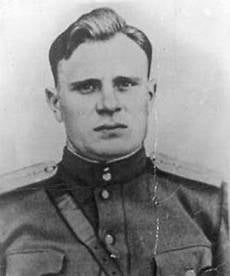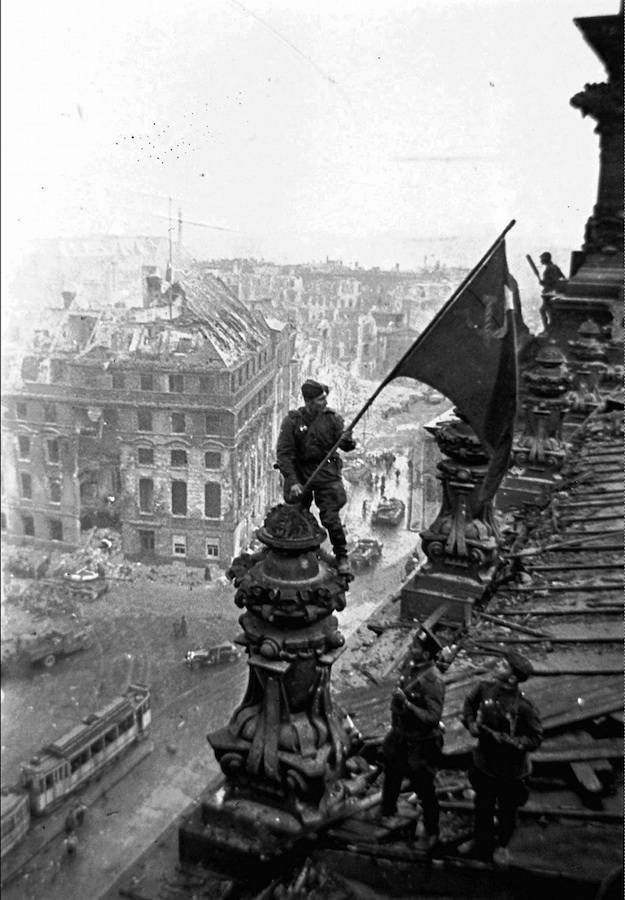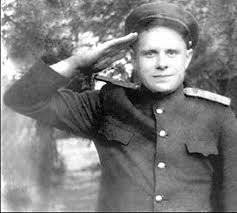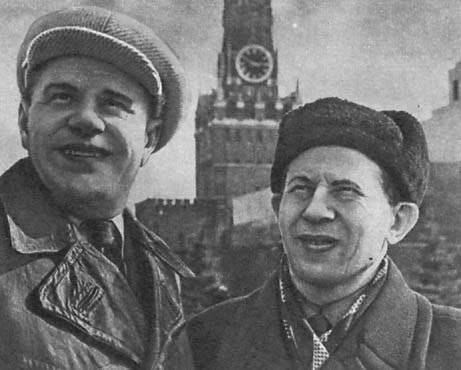Alexey Berest: the hero of the Reichstag assault died while saving a child
His name is Alexey Prokopevich Berest. March 9 coming 2015 year he would have turned 94 year. Aleksey Berest was born in a simple peasant family in the village of Goryaistovka, Akhtyrsky district of Sumy region 9 in March 1921, when in some places coals of the Civil War were smoldering. Prokop Nikiforovich and Kristina Vakumovna Berestov had sixteen children. But only nine of them survived the harsh years. In 1932, Alexey and his brothers and sisters became orphans. Fortunately, in a large family there are always older children who will not let the rest disappear - Berestov had elder sisters Marina and Catherine. It was they who, after the death of the father and mother, took upon themselves all the "heads of the family", having managed, at the very least, to raise and educate younger relatives.
The lot of Alexei had a harsh collective farm childhood, when he had to work in the field from dawn to dusk along with adults, and one also had to learn! However, even though Alyosha was an inquisitive child, he was never successful. And the character already in childhood was still the same! No matter how hard they tried to reverse him, he did not survive how many trials for his perseverance and non-indifference to everything, he always remained unconvinced. At sixteen, he enrolled in tractor training courses. Moreover, in order to become a tractor driver, he credited himself with two extra years - young Alexei was afraid that they would not take up studies, citing "juvenile years".
In October 1939, a volunteer enrolled in the Red Army. Participated in the Soviet-Finnish campaign. He served in the 2-th communications regiment of the Leningrad Military District. Behind these dry lines of the biography are hidden the qualities that are now called patriotism. But Aleksey Prokop'evich did not like loud words, he did not like pomp and vacuity, but he was not silent. His words were succinct, concise and categorical, like autobiographical memories of those years. During the period of the Great Patriotic War, he went from private to deputy battalion commander for political affairs. In other words, he didn’t make a special career, although he showed his personal qualities. Few people remember, but in the 5 series of the film "Liberation" Beresta played E.Izotov. And this is not just a coincidence of the last name - the authors of the film deliberately paid tribute to the hero, who was already beginning to be forgotten at that time ...
Berest began the war as a private soldier - a signalman, a year later he became the squad leader, and then the party organizer of the company. In 1943, the corporal Berest was selected among the best soldiers to study at the Leningrad Military-Political School. Despite the fact that Beresst did not have the required secondary education, front-line experience and positive characteristics did their job - he was accepted into the school and within a few months, Berest underwent a training course for officers. After a course of study at a school at that time stationed in Shuya, Berest was appointed deputy battalion commander for the political part of the 756 Infantry Regiment of the 150 Infantry Division.
 30 April 1945, by order of the first commandant of the Reichstag commander of the 756 Infantry Regiment Zinchenko FM, ml. Lieutenant Berest A.P. He headed the implementation of the combat task of hoisting the banner of the military council of the 3 shock army on the Reichstag dome. For this operation was awarded the Order of the Red Banner. Simply put, he, under the guise of a company of machine gunners Syanova, IA, in the 14 hours of the 30 minutes, climbing onto one of the columns of the Reichstag, attached a red flag to it. But the command even liked the idea altogether, it seemed that the red flag above the column was not very impressive and the order was given to install the flag over the Reichstag dome. It should be mentioned that the building was infested with hostile soldiers who had not even thought of adding weapon.
30 April 1945, by order of the first commandant of the Reichstag commander of the 756 Infantry Regiment Zinchenko FM, ml. Lieutenant Berest A.P. He headed the implementation of the combat task of hoisting the banner of the military council of the 3 shock army on the Reichstag dome. For this operation was awarded the Order of the Red Banner. Simply put, he, under the guise of a company of machine gunners Syanova, IA, in the 14 hours of the 30 minutes, climbing onto one of the columns of the Reichstag, attached a red flag to it. But the command even liked the idea altogether, it seemed that the red flag above the column was not very impressive and the order was given to install the flag over the Reichstag dome. It should be mentioned that the building was infested with hostile soldiers who had not even thought of adding weapon. Bursting inside, the detachment fell under heavy enemy machine-gun fire. Alexey Prokopievich managed to hide behind a bronze statue, but the shooting was so intense that the statue cut off his hand. Raising a piece of bronze, Berest threw it in the direction of the machine-gun point. Fire verse, apparently, the enemy took a piece of a statue's limb for a grenade. This moment was enough to rush forward. But the foundation of the flight of stairs was destroyed and of enormous height, Aleksei fulfilled the role of a springboard for almost two meters - this is Egorov MA on his shoulders. and Kantaria M.V. climbed higher. Berest was the first to reach the attic. Very rarely did he later talk about the past - at first it was somehow not customary to hold meetings with schoolchildren, and then he wasn’t called specifically. But his memories are preserved, as they tied the Red Flag to the bronze leg of a horse with soldiers' belts. Exactly, Aleksey Prokopevich recalled the apogee of this operation even a little ironically.

“In front of me, the command was tasked with leading and securing the erection of the Victory Banner. In a swift rush, we burst into the open passage of the central entrance of the building, whose doors were blown up by a grenade. At that time, with my participation, the standard-bearers, comrades Kantaria and Egorov, secured the army banner No. 5 on one of the columns of the central entrance to the Reichstag on April 14.30 on the 30 of April, ”Aleksey Berest recalled in the sixties (quoted in Yuzhny A.) hoisted the banner over the Reichstag?).
On the night of May 2, 1945, on the instructions of the command, wearing the uniform of a Soviet colonel, Berest A.P. personally negotiated with the remnants of the Reichstag garrison, forcing them to surrender. Again I will try to explain what was behind this. In reality, the garrison did not intend to surrender, and agreed to negotiate with the officer, a rank not lower than Colonel. However, among the Soviet soldiers and officers who broke into the Reichstag, the battalion commander Stepan Neustroyev was the most senior in rank - he wore captain's shoulder straps. Stepan Neustroev was a man of small stature and lean build, so he feared that the Nazis simply would not believe that he was a senior officer with the rank of colonel. And the bogatyr Alexei, like no one else, approached the role of a man capable of setting conditions, so he had the honor of putting on colonel's shoulder straps, even if it was for fun. Captain Neustroyev went with Alexey as an assistant. Berest gave the enemy two hours to think, and with a firm step went back without looking around. A shot was heard from the back, but Aleksey continued moving. Later it turned out that a bullet shot through his cap.
 For "exceptional courage and courage shown in battles" Berest AP He was introduced to the title of Hero of the Soviet Union, but, as they say, Marshal Zhukov did not hurt political instructors painfully, and, looking at the position of the reward applicant, decided that the Order of the Red Banner would be enough. In May 1946, the Presidium of the Supreme Soviet of the USSR, issued a decree “On conferring the title of Hero of the Soviet Union to the officer and sergeant staff of the USSR armed forces, to hoist the Victory Banner over the Reichstag.” The highest award of the Soviet state was awarded to five servicemen: captain Stepan Neustroyev, captain Vasily Davydov, senior lieutenant Konstantin Samsonov, sergeant Mikhail Egorov and junior sergeant Meliton Kantaria. Alexei Berest, who, as we see, played a significant role in the storming of the Reichstag, was not honored with the highest award.
For "exceptional courage and courage shown in battles" Berest AP He was introduced to the title of Hero of the Soviet Union, but, as they say, Marshal Zhukov did not hurt political instructors painfully, and, looking at the position of the reward applicant, decided that the Order of the Red Banner would be enough. In May 1946, the Presidium of the Supreme Soviet of the USSR, issued a decree “On conferring the title of Hero of the Soviet Union to the officer and sergeant staff of the USSR armed forces, to hoist the Victory Banner over the Reichstag.” The highest award of the Soviet state was awarded to five servicemen: captain Stepan Neustroyev, captain Vasily Davydov, senior lieutenant Konstantin Samsonov, sergeant Mikhail Egorov and junior sergeant Meliton Kantaria. Alexei Berest, who, as we see, played a significant role in the storming of the Reichstag, was not honored with the highest award. Immediately after the end of the war, Aleksei Berest was appointed head of the echelon, which was traveling from Germany to the Soviet Union and carrying back Soviet citizens ousted by the Germans — people who had a difficult fate after returning to their homeland. Berest drove on his way to his native village, where he fell ill with typhus and was placed in a military hospital. By the way, the hospital also played an important role in the life of the officer - it was there that he met a nurse named Lyudmila, who became his faithful companion for the next years of his life.
Aleksey Prokopyevich completed his military service in 1948 in Sevastopol as a senior lieutenant and as deputy chief for political affairs of a transmitting radio center of the Black Sea communications center fleet. Then he moved to the Rostov region. Here, in the village of Pokrovsky (today it is a district center) was the birthplace of his wife Lyudmila Fedorovna. Police foreman Petr Tsukanov, who at that time was the head of the bullpen of the local regional department, recalled: “Our neighbor died, Beresty settled in this house, and four of them with children. The floor is earthen, the walls are adobe, the roof is reed. Okonetsa - by the ground. Arrived - a suitcase and a knot with linen. Well, I could write potatoes, cabbage on the collective farm, shared with them. He was appointed head. district department of cinema. Sometimes he will invite me to the movie booth - we’ll have a drink, sit, he told me how he took the Reichstag, it seems he even raised a banner. And I myself reached Balaton ... ”(Quoted from: Gorbachev S. Berlin Marinesco). Berest lived modestly, but he never fawned or groveled before anyone - that was his life credo. And because of him, many problems Alexey Prokopyevich made himself. He often changed jobs - he headed DOSAAF in the Proletarsky district, then he was the deputy director of MTS in the Oryol region, and in the Neklinovsky district he headed the cinema department.
But the character was iron, and the time is tough. I made enemies or something else happened, but soon Berest was arrested. It is quite possible that the role that he persistently tried to achieve the truth and tell about his participation in hoisting the red flag on the Reichstag played a role here. In February, 1953, when Beresta was arrested, during an interrogation at the prosecutor’s office, the investigator provoked him into a fight. Birch was sentenced to ten years in prison for embezzlement, although seventeen people confirmed his innocence to the alleged offense. Well, at least, the term was reduced by amnesty - two times less. Berest served his fate, and returned to the Rostov region. Of course, there could be no talk of leadership. Family Beresta settled in Rostov-on-Don - in the village of Frunze. This is a small microdistrict of “private” and two-storey buildings on the border of the Alexander Grove on the one hand and Kiziterinovskaya gully on the other hand - a typical working village. Here lived the workers of the Rostov factories. Alexey Berest got a job at the plant. The hero of the war worked as a loader at the third mill plant, as a slave at the Prodmash plant, then sand-blasted at the steel mill of the Rostselmash plant.
Beresta family lived in a two-story house on the first floor. Birch bark was well known and loved both at the plant and at the village. The hero's daughter, Irina Alekseevna, talks about the great human kindness of his father Alexey Prokopievich Berest: “Like all powerful people, the father was very kind - to naivety. They have a new mechanic in the brigade - a soldier from the army. The bride is pregnant, but he does not marry: "There is nowhere to live." Father settled them, young, in our room, prescribed. The boy, when he drinks, was bad, and his father felt sorry for him. A girl was born to them. They have lived 4 year. Then they disappeared, and suddenly a family comes to our apartment - from Sverdlovsk. It turns out that our guy slowly exchanged our room for an apartment in Sverdlovsk. We have four neighbors. But the father made friends with this family ”(quoted in Gorbachev S. Berlin Marinesko).
3 November 1970, Alexey Prokopyevich Berest died tragically. Died, as befits a real hero, having committed the feat. He stood with his grandson in his arms when there was a cry "Train!" There was a child on the tracks - a girl. None of the eyewitnesses had even time to notice how Alexey Prokopievich had grabbed his grandson to the ground and rushed to certain death. He pushed the girl out of the way and took the blow of such strength that he was thrown far away onto the platform. Alexey Prokopievich Berest died in the hospital; he was only forty-nine years old. Of course, this physically strong person would have lived much longer and, who knows, maybe he would have found modernity, but to be a hero and accomplish feats, you see, Beresst was listed as a clan - that’s why he couldn’t hesitate, rushing for the child under the traveling train .
 Until the last days of his life, Aleksei Berest was very worried about the fact that the state did not notice his real military achievements, moreover, he was very offended by hiding for years in the “zone” on trumped-up and ridiculous accusation. Irina Alekseevna's daughter Beresta recalled: “In the sixties Neustroyev came to us several times (the same commander with whom Berest participated in negotiations with the Germans, playing the role of colonel - IP comment):“ Well, do you live in a communal apartment , in such bestial conditions? "Not that with regret, but with some feeling ... complacency, or something:" Do you even have no phone? ". And as they drink, Neustroev removes his Golden Star and gives it to his father: “Lesha is on, she is yours.” Father replies: "Well, that's enough ...". It was unpleasant for the father, it hurts. He suffered to the end of his life. When they showed military holidays or parades on TV, he turned it off (quoted in Gorbachev S. Berlin Marinesko).
Until the last days of his life, Aleksei Berest was very worried about the fact that the state did not notice his real military achievements, moreover, he was very offended by hiding for years in the “zone” on trumped-up and ridiculous accusation. Irina Alekseevna's daughter Beresta recalled: “In the sixties Neustroyev came to us several times (the same commander with whom Berest participated in negotiations with the Germans, playing the role of colonel - IP comment):“ Well, do you live in a communal apartment , in such bestial conditions? "Not that with regret, but with some feeling ... complacency, or something:" Do you even have no phone? ". And as they drink, Neustroev removes his Golden Star and gives it to his father: “Lesha is on, she is yours.” Father replies: "Well, that's enough ...". It was unpleasant for the father, it hurts. He suffered to the end of his life. When they showed military holidays or parades on TV, he turned it off (quoted in Gorbachev S. Berlin Marinesko). A real hero was buried in the small Aleksandrovsky cemetery (the former cemetery of the Aleksandrovskaya stanitsa, which is now part of the Proletarsky district of Rostov-on-Don). In Soviet times, pioneers were taken at his grave, flowers were carried on Victory Day, and veterans held various meetings. In 1990-s, the time of general devastation - in the country and in the heads, manifested in the crappy behavior of young people, on the bust installed over the grave, vandals beat off the ear and the nose, checking whether it was made of color. And today, his grave, though cleaned, still leaves a depressing impression, as it is located at the entrance to the cemetery, where the rubbish from other graves is being taken down.
6 May 2005 for military courage in the Great Patriotic War 1941-1945, personal courage and heroism shown in the Berlin operation and hoisting the Victory Banner over the Reichstag . It turns out that the memory of a true hero and a Russian person was honored in Ukraine more than in Russia, to whose service Berest gave the best years of his life, gave heroically and heroically died, saving the child from under the train.
Why did the merits of Berest remained unmarked by the high title of Hero in the Soviet Union and then in Russia? It is unlikely that anyone will be able to answer this question. Public organizations and veterans repeatedly sent letters to Moscow with the request to confer the title of Hero of the Soviet Union, and then the Hero of the Russian Federation, Alexey Prokop'evich Berest. However, every time they were refused. At the same time, almost every native resident knew that Berest was setting the red flag on the Reichstag in Rostov-on-Don. After all, on the territory of the Rostselmash plant, a bust of memory was erected for him, Bereste was constantly remembered on Victory Day, veterans said. However, the title of Hero of the Soviet Union to Berest was awarded, however, only by an organization of social and political persuasion, called the “Permanent Presidium of the Supreme Soviet of the USSR” (the leader is Soji Umalatov).
The name of Beresta is also included in the number of nominal "stars" on the Rostov Avenue of Stars. Also, one of the streets in the Selmash microdistrict of Pervomaisky district of Rostov-on-Don and secondary school No. 7 of the same city are named after Beresta. And yet, among Rostovites, like other people who are not indifferent to the fate of this amazing man, a true hero, there’s no hope that someday the Russian government will descend to appreciating the merits of Aleksei Prokop'evich Berest, and assign him the title of Hero of the Russian Federation posthumously.
Information